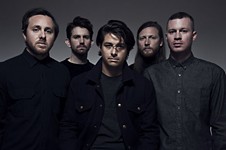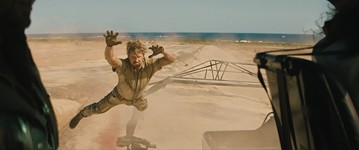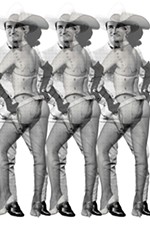SXSW: Nik Turner Spreads His Cosmic Wings
Hawkwind co-founder to re-enact the 'Space Ritual'
By Richard Whittaker, 2:07PM, Fri. Mar. 15, 2013
Nik Turner, playing 12:30am tonight at Rebels Honky Tonk, remains a space rock pioneer borne into the musical cosmos on the wings of Hawkwind, stranger in a strange land and a friend to all. He’s the hippie playing with punks, the free jazz saxist amongst metallers, as happy busking in London as improvising in Egypt’s Great Pyramid.
Even though Turner got kicked out of the Hawk nest (twice) back in the Eightues, on March 15 he revisits his legacy with a full performance of the seminal Hawkwind live album, 1973’s Space Ritual. He’s not lining his nest with graying feathers just yet, however.
His old label Cleopatra lured him into blasting and wailing away for former Yes guitarist Billie Sherwood’s new project, Fusion Syndicate. That’s triggered a new touring band, an autobiography, a documentary from the team behind SXSW Film 2010 rock doc about his old bassist, Lemmy, and a new album of space rock.
“Brian Perera at Cleopatra Records is the guy who’s instigating this stuff,” he says. That the plan translates into creating something like “the continuation of where Hawkwind should have gone.”
Nik Turner performs Space Ritual tonight, and also holds a signing on Saturday, 3pm, at End of an Ear Records, 2209 S. First.
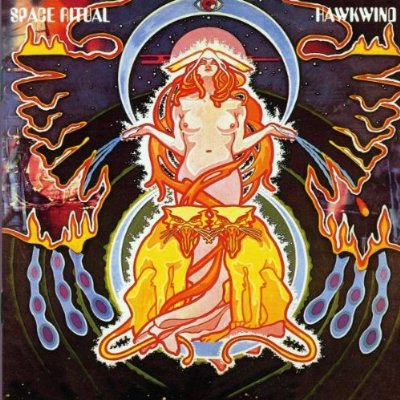
Austin Chronicle: You do all these different things, perform in all these different bands but somehow it all circles back to Hawkwind. What do you think it was about them that keeps bringing it back into your life?
Nik Turner: Hawkwind touched a lot of people, and “Silver Machine” was a big hit in this country. I eternally meet people who say, oh, yeah, Hawkwind, that was the first band I ever went to see. I was talking to a guy who plays bass who said, “I saw Hawkwind when I was 14, and I really wanted to be bass player.” He played with the Damned [Captain Sensible]. I did some recording with him the other day at my house, and he was saying how much he was influenced by Hawkwind, probably Lemmy as much as anything else.
Hawkwind had this spirit. We did things other people wouldn’t do. We’d play free gigs anywhere. [Austin-based writer Michael Moorcock] influenced the band and was influenced by the band. He then started organizing these free concerts in Portebello Road under the flyovers, in conjunction with guys like [designer] Barney Bubbles. Mike would have a stall under the flyover where he’d sell things. I think it was all part of funding New Worlds magazine that he was editing at that time. That’s where it all came together. It was free music, but it was music with a spiritual base and a spiritual ethos, and I think that people came to the gigs because it wasn’t just a pop band. It was a total happening.
Malcolm McLaren would come to these gigs, and the Sex Pistols. One of their early claims to fame was that they’d been roadies for Hawkwind. The Sex Pistols said, “These other bands are boring old farts, except for Hawkwind.” All these other heavy metal and pop bands like Deep Purple, they considered them boring old farts. But Hawkwind weren’t. I think the band had that effect on people. It was never slagged off as yesterday’s music. You can’t imagine the Sex Pistols had very much respect for anyone, but they respected Hawkwind, which is quite a revelation that we were credited and lauded by these young lions.
AC: You’ve always worked with any musician you can, never musically ghettoizing yourself by saying, “Oh, I’m only going to play free jazz.”
NT: To me, it’s all just music. Music is a spiritual thing, it’s a language. You have to learn the vocabulary, which is the practice you do, and then you’re ready to express yourself. I adhere to the cliché that there’s only two kinds of music: good music and bad music. I try to produce good music, and I think bad music is produced by people who don’t put any soul into it. Those that just cover other bands without giving it some of themselves.
I like to listen to music I can learn from. I think that about the music I’ve been involved with. I’ve had a soul band, a funk band, a Latin Jazz band, a punk band, a space rock band, a spiritual mumbo-jumbo band, which was producing music I’d thought of while playing my flute in the Great Pyramid. Everything I’ve done has been a spin-off from everything I’ve ever done. I tend to like what I like and reject what I find boring, really.
C: Who are the collaborators you look at and think, maybe it’s not well-remembered, but I wish people could listen to, either because it was musically really good or just a good experience for you personally?
NT: Working with Steve Hillage was really good. Working on Sphynx, I went to Egypt for a holiday and realized what a great sound the Great Pyramid had. Paul Horn had actually recorded inside there before me. I found this out afterward, after I had done my recording. I listened to what he did, and I thought what I’d done was far more inspirational because I wasn’t just doing exercises. I was playing whatever I thought of at the time and thinking of the Egyptian Book of the Dead as inspiration.
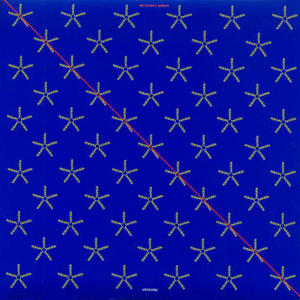
When I came back to Britain, I realized I didn’t have anything to do except for what I wanted to make, so I approached my record company about making this thing into an album, using what I had recorded on my flute in the king’s chamber and the sarcophagus. I managed to get Steve Hillage interested in collaborating, and he produced the album actually. I thought that was great, because he was someone that I’d had a lot of respect for for a really long time, and whom I had vaguely worked with.
I’ve played on loads of stuff. I did an album with the Stranglers. Hugh Cornwell was in jail on possession of heroin, and the band had some gigs they had to fulfill, and they invited me and a bunch of other musicians to come along. It was great fun, really. I got to play four or five of the Stranglers’ songs. They had people like Robert Smith and Robert Fripp from King Crimson and Ian Drury and Davey Payne and Steel Pulse. That was all very spontaneous, and really classy stuff. They played this song where they had girls stripping, and I put on this rapist mask with a police headband around it.
I played with Spirit as well. I’d do tours with some of these bands and then end up playing with them. Sham 69, I played on all their albums. Cockney Rejects, Angelic Upstarts. I’ve had a lot of collaborations with people, and a lot of different styles of music, which I find quite stimulating. I just try to put something of my own individuality into these things.
I was doing some recording with Captain Sensible, and they came to my house last week and said, “We’ve got some songs and we wanted to record some sax on them.” So they turn it on and I just start blowing, and at the end I asked, “Does it sound any good?” and they said, “Fantastic.” “Really? Wow.” I said, “You’ve got any others you want me to do? What do you want me to do on them?” They said, “Do what you like.” So I blow away and do some really weird music, and at the end they say, “Fantastic, we’ve got everything we wanted.”
I did four tracks with them, and it was very stimulating. I played with the Damned quite a lot. I’d turn up at their gigs and they’d give me a microphone. I’ve played with a lot of bands like that. I’m open to learning from people. Stealing their ideas, I think it’s called.
AC: You steal from one person, it’s theft. You steal from a lot of people, it’s research. But talking about the punk bands you worked with – there’s this whole thing that they opposed the rock establishment, but you look at who they were influenced by and who they worked with, and they really were looking for people who were dissident and outside of the mainstream. They weren’t throwing everything out the window.
NT: Not at all, no. They were still influenced by and impressed by and grew up on them, and I think Hawkwind was one of those bands. And rather than rejecting them as being yesterday’s music, they embraced them as being very influential and had a lot of respect for them. It’s quite cool, really. You take the good things and dump the things they had problems relating to.
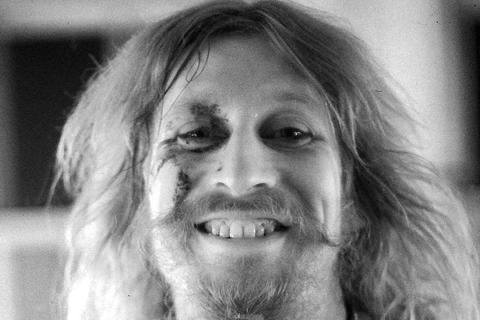
AC: You’ve got all these projects coming up: Do you ever think of slowing down? I’ve talked to a few older creatives, like Neal Barrett Jr., who’s a friend of Mike’s, and he said he still has all these great ideas but realized he’d rather just stay home with his wife. And then you have others who say, Gotta keep going, gotta keep going.
NT: I just have this thing that I have an idea and I do it. I went to Mexico and spent some time in Mayan ruins, and I’m really into Miles Davis, and I’m really into Bitches Brew. I saw Miles Davis playing all that stuff at the Isle of Wight Festival. That was in 1970, and Jimi Hendrix dedicated a song to me at the time, “Foxy Lady.” But I was very impressed by Miles Davis. I grew up on Milestones and Charlie Parker and all these other people, and I thought I’d like to put a band together that was inspired by Miles Davis.
So I put a band together called Outriders of the Apocalypse, which was about the Mayan mythology and the coming of the end of the Fifth Sun. I spent some time studying Mayan mythology and visited Palenque and all these Mayan locations, Teotihuacán and Tulum and Monte Alban, and I was very impressed by this and I thought I’d like to record some flute music at these locations.
I’d read this book at the time called The Fingerprints of the Gods by Graham Hancock while I was in Mexico. It described all these fantastic things that had seemingly transpired there, and I figured that these Toltec heads, they have African features. So I devised my own mythology of the Mayans, because the Spaniards burnt all their books, all except two of them. So I figured I’d make up my own stories of Quatzequatel coming from Atlantis when Atlantis sank, and him bringing all this knowledge of astronomy, astrology, mathematics, science, civility, agriculture, and he brought them to the Aztecs.
I think they were giants, and they were from Africa, and I think the Toltec music is probably derived from Arab music. I just speculate about these things, so I figured that I’d study Spanish classical music. And a lot of it comes from Arabic music, from Morocco, from the Moors, so I thought I’d make up the music and be influenced by Spanish classical music. Some of it’s influenced by Stravinsky and Rimsky-Korsakov, and then I sort of spontaneously devised these lyrics that were based in the Mayan mythology, and put it together as a piece.
I’ve got a film on YouTube of this bands. I’ve got a lot of bands. I’ve got a band called Project 9 that plays everything my bands have played, including Hawkwind and Outriders and Inner City Unit and Sphinx. I’m actually doing a gig with that band the day before I come to America.
AC: You’ve worked under so many bands and with so many people, how do you decide? How do you put that name on a moment?
NT: Well, Project 9, it was the ninth project. I think of all the bands I’ve been in as “projects.” They all have a limited life, although they have a rather extended influence. I just have ideas and I like to do them. I’ve been managing myself for 40 years, and mostly driven the van around with the band and the equipment in it, so I’m rather self-sufficient.
Any idea that I feel moved to do something about, I will do. I don’t have any preconceptions about, “I will form this band and it will play this sort of music.” I get a band together and devise some music and then think what should I call it? I take on other people’s impressions, so the Outriders of the Apocalypse was named by one of the bass players. It’s a band that has two bass players, one girl playing trombone, another one playing trumpet, I play saxophone and flute, two guitarists and a drummer. Hopefully, the whole thing comes together. I never rehearsed. I gave everybody the bass line, which I devised, and then we did a gig.
We were headlining a festival and we hadn’t rehearsed. I just told them at the beginning, well, this is the riff that we’re going to work around, and that was it. We did a two-hour set based around these different riffs, and it just worked. I’d flown from Berlin with this band called Hawklords that I’d formed that was based on the original Hawklords. I’d done this Robert Calvert memorial at this hall near where he used to live, and I got this band out of it, and we toured around Europe, and then flew from Berlin straight to the festival. I got there about two hours before we played, and just sat and chatted with the band, and we just played. It was completely spontaneous and completely unrehearsed and everybody was completely in the dark about what we were going to do.
I saw a film of Miles Davis recently at the Isle of Wight Festival, and the band described something there that was like that happening to them. They got there and Miles gives them a bit of a riff, and they build a whole number, a different 20-minute song, just using a riff.
A note to readers: Bold and uncensored, The Austin Chronicle has been Austin’s independent news source for over 40 years, expressing the community’s political and environmental concerns and supporting its active cultural scene. Now more than ever, we need your support to continue supplying Austin with independent, free press. If real news is important to you, please consider making a donation of $5, $10 or whatever you can afford, to help keep our journalism on stands.
May 9, 2024
May 10, 2024
Nik Turner, SXSW, Hawkwind, Space Ritual, Lemmy, Captain Sensible, The Damned, The Sex Pistols, Cleopatra Records, Sphynx, Robert Fripp, King Crimson, Ian Drury, Davey Payne, Steel Pulse, Hugh Cornwell, Michael Moorcock





